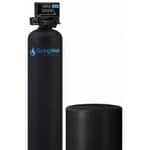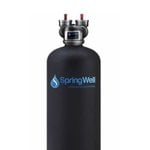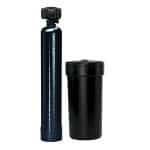Hard water, a costly problem for millions of US homes, it drives utility bills higher and sends expensive dishwashers and water heaters to the landfill.
Thankfully, the solution is simple. Soften your well water with one of these 7 top-performing water softeners for well water.
Expert Picks:
- Our Top Pick: Springwell SS1 Salt-based
- Best High-Capacity System: Softpro Elite Salt-based
- Most Versatile: Pentair Salt-based
- Salt-Free System: Aquasana Rhino salt-free
- Environmentally Friendly: Springwell Futuresoft Salt-free
- Budget Friendly: Fleck 2510sxt Salt-based
#1 Springwell SS1 – Best Overall
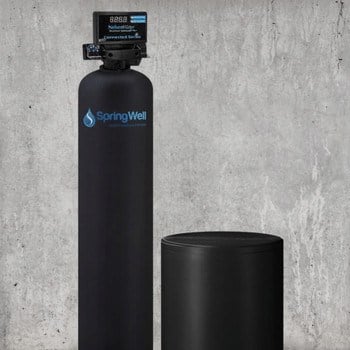
SpringWell’s Salt-based combo filter and softening system treats up to a million gallons of water maintenance-free. It removes hard minerals plus iron, hydrogen sulfide, manganese, chemicals, heavy metals and more.
Metered regeneration technology saves water and salt. The Bluetooth-enabled digital head lets you view the system’s status and control its many functions from a phone or tablet.
- Broad-scale contaminant removal
- Low-maintenance
- User-friendly interface
- Quiet operation
- Satisfaction guaranteed
Use Coupon Code: QWL5 to save
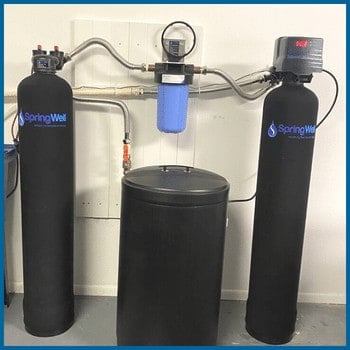
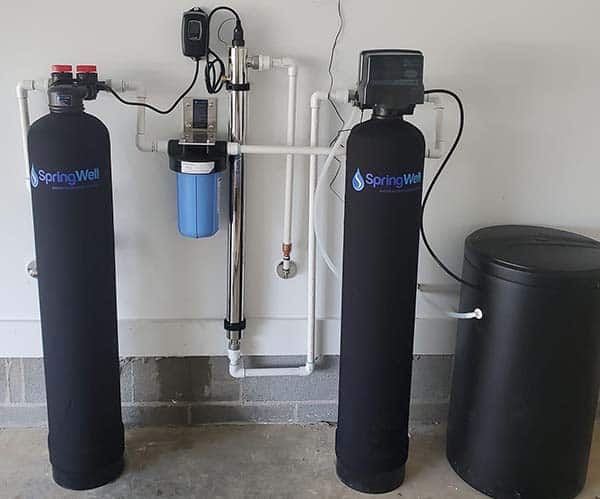
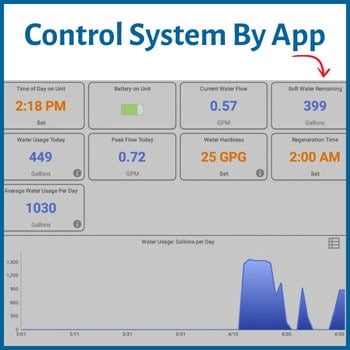
Great for: Springwell SS1 salt-based system is the perfect solution for anyone looking for the best in all categories in water softening.
Not Ideal for: Those that live in certain municipalities that don’t allow salt-based filtration. I would opt for Springwell’s Futursoft that can come close to the SS1.
Pros
- SpringWell filtration systems come complete with everything you need for quick DIY installation.
- The only company to use all certified parts, their systems are backed by a limited lifetime warranty and SpringWell’s legendary customer service.
- It removes up to 7 PPM of iron, 1 PPM of manganese and 8 PPM of hydrogen sulfide — the gas that causes rotten egg odor. Manganese and sulfur are common in wells with iron.
- SpringWell filters are engineered to have the best flow rates in the industry — 11-20 GPM. That’s nearly twice the national average.
- This system is whisper-quiet, eliminating the wall-shaking blasts of compressed air common in older AIO systems during regeneration.
- SpringWell’s whole house filter and softener for well water offers a higher level of protection than a softener alone with a quality brine tank.
- The price is jaw-dropping, but you get what you pay for.
- It removes iron — a mineral that can ruin some softeners — plus heavy metals and other contaminants that put your family at risk.
- For hard water alone, it’s more than you need. But for complex water quality issues, it’s an extraordinary value.
Cons
- The price is a little steep, but the overwhelming support and features you get will justify the price..
- We do wish the fittings were metal and not plastic, but that’s becoming an industry standard.

Product Updates
- Now offers multiple sizes to accommodate larger homes
- Optional UV add-on
- Optional Reverse Osmosis add-on
#2 SoftPro Elite
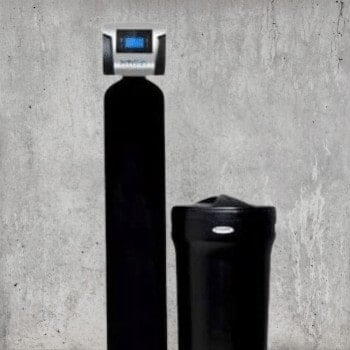
The SoftPro Elite is a high-efficiency, salt-based system with a surprisingly advanced design given its budget-friendly price. Perfect for wells, it removes hard minerals and up to 3 PPM of iron using up to 50 percent less salt.
Great overall value for the money.
- Value-priced
- Efficient
- Won’t impact water pressure
- Lifetime warranty
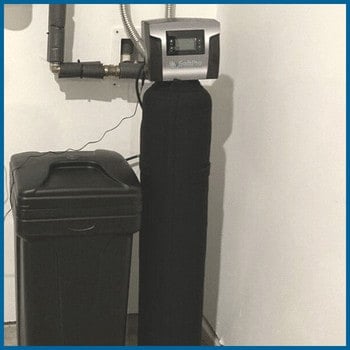
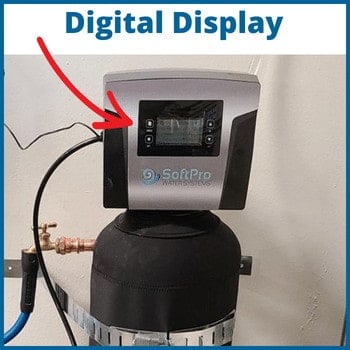
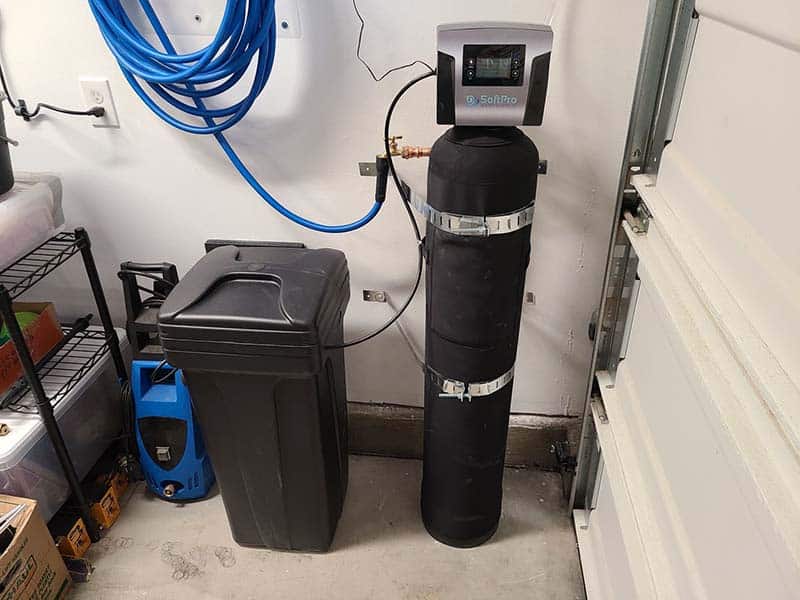
Good For: Those looking to save money on a great system and don’t need an app to control it.
Not ideal for: Anyone looking for complete control of this system remotely will want to lean towards Springwell’s SS1.
Pros
- Engineered for convenience, it’s simple and intuitive to program with no confusing jargon.
- The Auto Reserve feature ensures a steady supply of soft water, even when demand is high.
- Straightforward to install, the SoftPro Elite comes with a lifetime warranty. You won’t be disappointed.
- Other softening systems produce enough brine solution to regenerate a full tank of resin each cycle. The SoftPro Elite makes just enough to rejuvenate the depleted resin, saving up to 650 pounds of salt annually. Maintenance is minimal.
- Everything you need is included for 1-inch plumbing except drain tubing. While supplies last, you’ll also receive a complimentary neoprene tank cover that helps control condensation.
- The salt in a quart of soft water is equivalent to a slice of white bread. For very low sodium diets, the SoftPro Elite is also compatible with potassium chloride, a salt substitute.
- SoftPro softeners are top sellers because they make treating hard water easy.
- They don’t solve every problem, but their motto is “keep it simple.”
- If you need a softener but are intimidated by the technology, the SoftPro runs on autopilot.
- For wells with hard water and low to moderate iron levels, fewer models offer as high a return on investment.
Cons
- Removes less iron than similar systems.
- Nothing else worth mentioning.
SoftPro Elite Product Updates:
- Free, quick connect hoses — other’s charge for this!
- Upgraded 1″ plumbing ports — this is a huge improvement in water flow.
#3 Pentair Salt Based
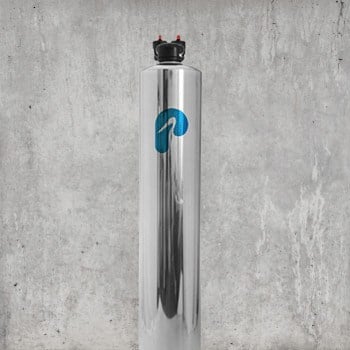
Pentair is true to their name, offering flexible features other models lack.
Choose from three modes of operation, 36 preprogrammed regeneration cycles and a double backwash option. For experienced homeowners, no softener offers more control.
- Metered softening
- No impact on water pressure
- Safety-certified
- Attractive chrome tank jacket
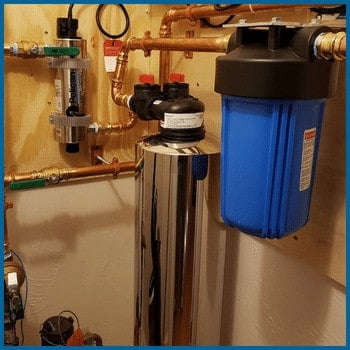
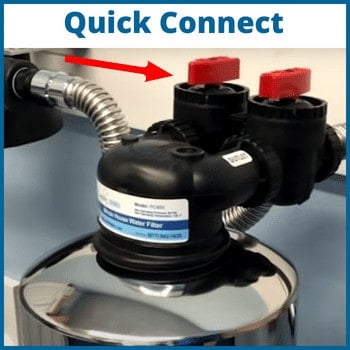
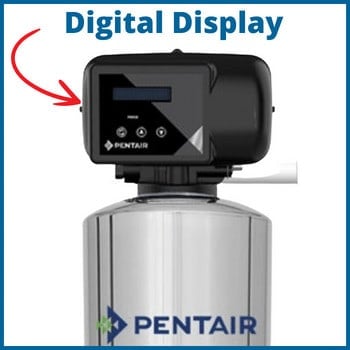
Great for: Those looking for a septic safe softener.
Not Ideal for: Well owners with high levels of Iron.
Pros
- The metered regeneration is efficient, conserving salt and water. Made of premium components, systems are NSF 44 certified for structural integrity.
- It’s quality you can feel right out of the box and performance you can trust.
- Chlorinated city water is tough on softeners, but for wells, the resin can last up to 25 years depending on your water quality.
- Extensive research shows that briny discharge isn’t harmful to your septic tank or drain field. In some cases, the added calcium improves soil percolation.
- It removes most clear (ferrous) iron, but its efficiency depends on other factors from hardness to pH. Rust (ferric iron) can foul the media.
- We recommend installing a sediment prefilter or using a resin-cleaning compound occasionally to remove large particles.
- Pentair is a leader in the industry. From the most durable tanks to the solid-state electronics, they’re feature-packed and bulletproof.
- If you need a basic softener on a budget, you can buy a capable model with fewer bells and whistles for significantly less.
- But if you’re investment-minded and can afford the extra upfront, quality is always a winning bet.
Cons
- The price is 50-percent higher than similar systems, so when is buying a Ferrari worth it when a Ford will do?
- Confusing multi-tier warranty
Product Updates
- Now offers connected salt level detector – this is a wireless salt level monitoring system that will notify you when your salt levels get to low.
#4 Aquasana Rhino Salt-Free
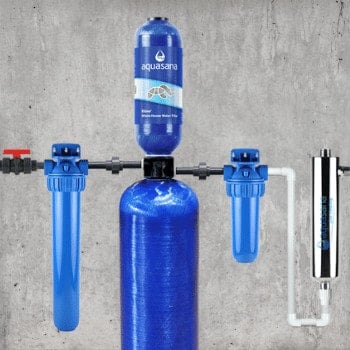
Aquasana’s multi-stage Rhino filtration system eliminates the widest possible range of contaminants from dangerous heavy metals to bacteria and viruses.
It includes a UV light filter for the ultimate protection plus a salt-free water conditioner to control limescale. Your water will look, feel and taste like nature intended.
- Comprehensive filtration
- Makes water potable
- Controls limescale without salt
- Straightforward maintenance
- 90-day satisfaction guarantee
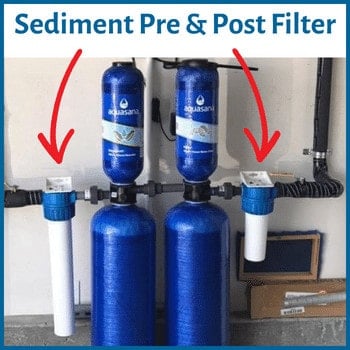
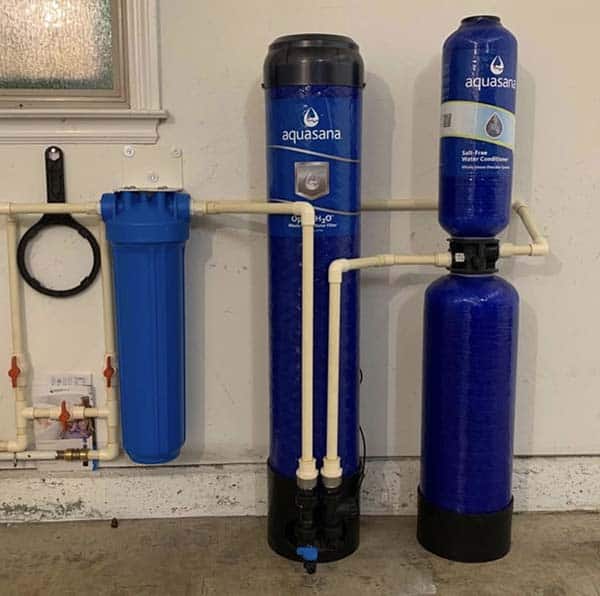
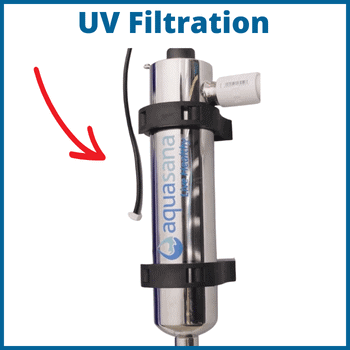
Perfect for: Those looking for a environmental system for well water or don’t want the headache of filling a salt tank.
Pros
- Low-maintenance, it’s environmentally friendly and creates no wastewater.
- Independently tested, it’s guaranteed to perform for five years or 500,000 gallons without reducing water pressure.
- Manufactured in the US, the Rhino is backed by a 60-month warranty.
- Hard water will cost you money. But contaminants like lead and bacteria can cost you your health.
- The Aquasana isn’t cheap, but it’s among the most comprehensive filtration systems money can buy.
- It’s less expensive than purchasing a well water conditioner, filter and UV sterilizer separately, and the components are designed to work together — you won’t have to troubleshoot compatibility issues.
- Not every homeowner needs the capability the Rhino offers, but whether you have a heavily contaminated well or just want the peace of mind that comes with premium filtration, no system protects you better.
- The salt free system features four filters plus a UV light. The primary filter is changed every five years.
- The salt-free conditioning tank lasts six years.
- The inexpensive pre- and post-filters should be changed every 3-6 months. Replace the UV light annually to ensure maximum potency against harmful microorganisms.
Cons
- This system requires above-average DIY skills to install.
- In fact, Aquasana once made the full warranty contingent on professional set-up.
- Shorter than average warranty
Product Updates
- Anti-scale technology by transforming hard minerals into inactive microscopic crystal particles.
#5 SpringWell FutureSoft Salt Free
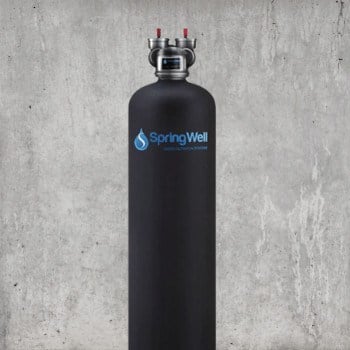
SpringWell’s water conditioner prevents 99.6% of limescale without salt or chemicals. The technology is simple — Template Assisted Crystallization (TAC) changes minerals into crystals that can’t cling to metal pipes.
Environmentally sustainable, it produces no wastewater and requires no electricity.
- Economical
- Retains healthy minerals in drinking water
- Low-maintenance
- Brisk flow rate
- Satisfaction guaranteed
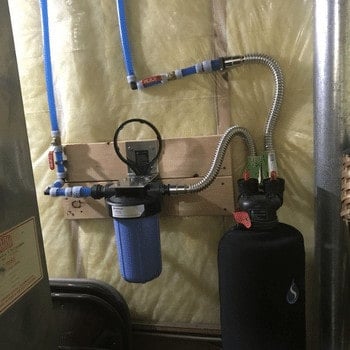
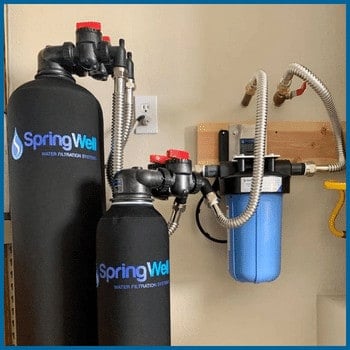
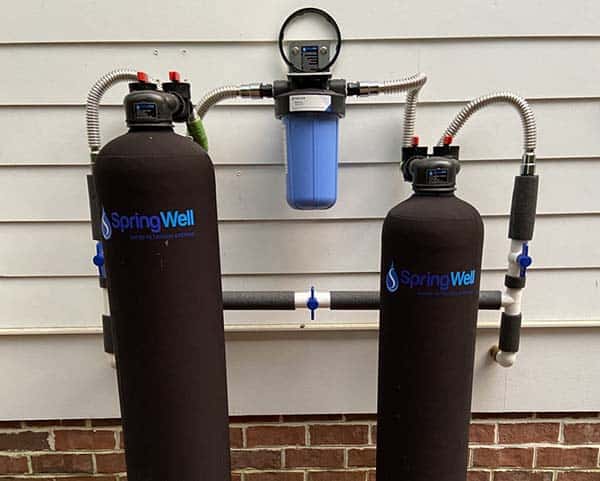
Pefect for: Anyone looking for the best environmentally safe system, will want Springwell FS1.
Pros
- The advanced, high-capacity design is a breeze to use and virtually maintenance-free. Components are performance-certified and ultra-durable.
- Choose from two sizes that guarantee brisk water pressure.
- Covered by an industry-leading lifetime warranty, SpringWell’s FutureSoft is the effortless approach to hard water.
- Old-school softeners have a reputation for being a nuisance. The salt tank refills and noisy backwashes are enough to scare some homeowners into living with hard water.
- Here’s a budget-friendly, set-it-and-forget-it system that lasts a lifetime without costly maintenance.
- If you want the benefits of soft water without the worry, SpringWell’s FutureSoft is the answer you’ve been looking for.
Cons
- Less effective than salt-based systems at reducing soap scum.
Product Updates
- Easy installation kit
- UV add-on
- Works with whole house filtration systems
#6 Fleck 2510SXT
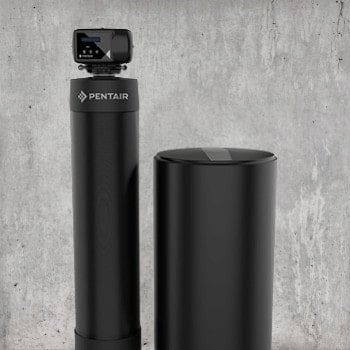
For tackling iron, look no further than the Fleck 2510SXT.
A budget-friendly salt-based system, its fine mesh resin lasts up to twenty years and removes up to 3 PPM without a separate filter.
- Affordable
- Efficient
- Removes iron
- User-friendly digital interface
- Battery backup preserves settings in power outages
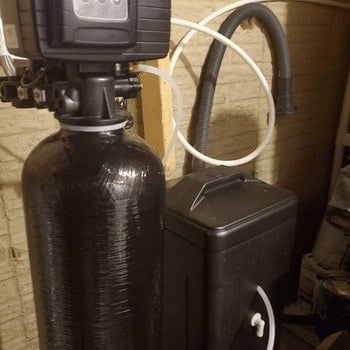
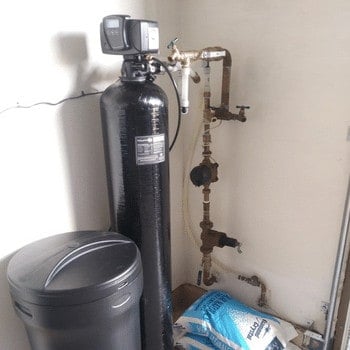
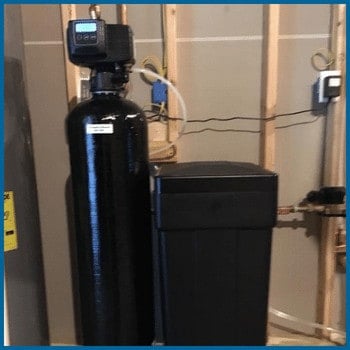
Great for: Anyone looking for a budget friendly softening system for well water that works really well.
Pros
- The advanced flow meter monitors water usage and regenerates only as needed, saving you money.
- It’s backed by a 10-year warranty and a 6-month satisfaction guarantee.
- If you don’t like it, send it back for a full refund — no questions asked.
- The Fleck 2510SXT is equipped with fine mesh resin that can handle the hardest water.
- This system can handle iron up to 3PPM for 30-percent less than systems with fewer advanced features.
- Available in sizes from 24,000-48,000 grains, it’s a reliable, affordable way to soften your water.
- The Fleck 2510SXT comes in several sizes to match well pump production rates from 6-11 or more GPM.
- The regeneration process takes about two hours. Soft water is not available during that time, so we recommend scheduling it overnight.
- Homeowners with basic plumbing skills can install this system in about a day.
Cons
- May slightly reduce water pressure.
Product Updates
- Now offers multiple grain sizes to accommodate larger homes
Didn’t find what you’re looking for? See our other reviews:
How We Chose
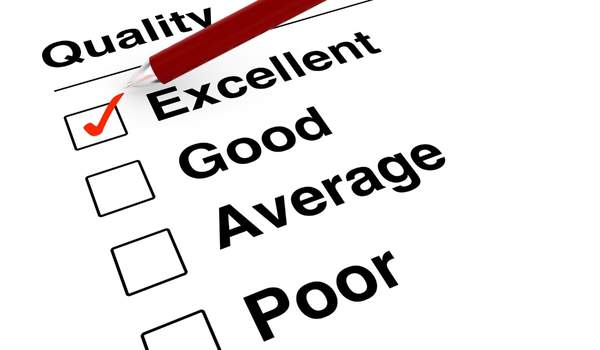
Choosing the right filtering system can be like navigating a maze, but don’t worry, we’ve done the legwork for you! We carried out an exhaustive analysis, touching base with real users and experts in the field.
By scrutinizing each system with a fine-toothed comb, we’ve created a comprehensive guide. Follow us to ensure you make the right choice and steer clear from the inefficient or overpriced models!
- Groundwater Specific Needs: Given the natural contaminants often found in well water, we prioritized systems adept at tackling iron, manganese, and sometimes even sulfur.
- Filter Longevity: With well water, filters can get saturated quickly. We looked for systems with durable and long-lasting filters.
- Efficiency: Systems with high grain capacity were favored. We wanted to ensure that homeowners don’t have to regenerate too frequently.
- UV Protection: Given that well water can sometimes have microbial contaminants, UV protection was an added bonus.
- Maintenance Alerts: Devices that signal when maintenance or filter changes are required scored extra brownie points.
- User Reviews: We deep-dived into user feedback, especially from those with well water, to gauge real-world performance and reliability.
- Environmental Impact: Systems with eco-friendly features, like reduced water wastage, stood out.
- Cost of Ownership: The long-term costs, including maintenance and power consumption, were also weighed in.
Our rigorous research ensures that our recommended softeners for wells are tried, tested, and adored by many homeowners like you!
Buyer’s Guide

Dive into Well Water Softening
Let’s make a splash as we navigate the deep waters of water conditioning!
Why Soften Well Water?
Let’s be honest, nobody has time for the hard water drama! If you’re tired of the limescale buildup, the dry skin, the spotty dishes, and the underperforming appliances, you’re in the right place. Unveil the multitude of benefits that a quality water softener brings to the table. Let’s rediscover the joy of crystal clear, soft water together!
- Heavy Metals: With iron and manganese, well water can be quite the headbanger. Softeners can help bring the melody back.
- Natural Contaminants: Unlike city water, well water isn’t treated for microbial contaminants. Some water softeners with UV can play the defense.
Types Of Well Water Softeners

Feeling overwhelmed by the choices? We get it. Let’s demystify the world of water softeners together. Explore the pros and cons of each type, understand the science behind them, and get a clearer picture of what each system can do for you. Arm yourself with knowledge and make an informed, confident decision.
- Ion-Exchange: Your conventional softeners, these tackle hard water by exchanging calcium and magnesium ions with sodium or potassium ions. Perfect for dancing with well water’s unique mineral composition.
- Salt-Free: These systems condition water rather than soften it. They’re best suited for moderately hard well water.
- Dual Tank: Well water consumers might find these beneficial. When one tank regenerates, the other takes over, ensuring uninterrupted soft water supply.
- UV Protection: A star player if your well water has microbial issues.
- Magnetic & Electronic Descalers: These can be handy sidekicks, ensuring your water appliances remain scale-free.
Choose based on your water test results. It’s not about getting the fanciest system but the one that waltzes perfectly with your well water!
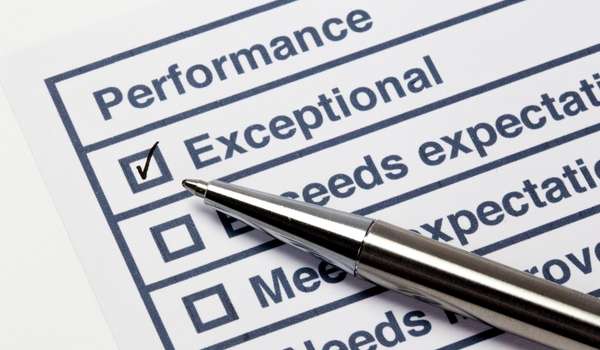
Key Considerations
- Filtration Process: This the most important factor to consider when buying a softener for private well water. It should be able to handle contaminants such as iron, manganese, and other minerals that can cause hard water.
- Capacity: You want to make sure the system you buy has enough capacity to handle all of your water needs at peak demand. Try to calculate your 7-day average of water usage by taking notes of from your water meter am/pm.
- System Type: You have two options – salt-based or salt-free conditioners. Either system has its own pros and cons and it’s also important to check with your local water department to see if you can use a salt-based system — some towns don’t allow them.
- Flow Rate: This is a critical to pay attention to, get this wrong and you could slow your water flow down to a trickle if you’re running at peak demand. Most families of 4 can get by just fine with a system that produces 9GPM.
- Installation & Maintenance: Many of the systems are DIY friendly. However, in most cases, you’re better off hiring a professional contractor to install your new system. The maintenance requirements are pretty low in comparison to other big brands.
- Ease of Use: Look for models that require the least amount of maintenance, or brine tank refills. Systems that can auto-regenerate, and models that can be operated and monitored by your phone/tablet app.
- Certifications: It’s important to check that the product has been certified by a reputable organization, such as NSF International or WQA — you can count on these organizations to provide truthful and accurate testing so that you can have peace of mind in your purchase.
- Long-Term Cost: This should be pretty standard, but often overlooked and should be taken into consideration before any purchase. Nobody wants a money-pit of a system that goes through bags of salt, or pre-filters, etc.. Pay close attention to the manufacturers guidelines and calculate the annual costs. We have them listed for each product for your convenience.
Advantages & Disadvantages: Salt-based Vs Salt Free

Pros of Salt-Based systems:
- Removes hard minerals like calcium and magnesium from water with high efficiency.
- Great for most residential, commercial applications where permitted to use.
- Longer lasting due to salt brine regeneration cycles that prevent mineral buildup on surfaces over time.
- Cost effective solution for reducing high levels of hardness from your water supply and reducing appliance failures.
Cons:
- Higher long-term costs due to annual salt-usage.
- The need to use certain types of salt in order to prevent salt-bridging, etc.
- Requires regular maintenance and upkeep for the system to function properly.
Pros Of Salt Free:
- Eco-friendly option since no additional salt or chemicals are needed for operation.
- Less maintenance than salt-based systems since there is no need for regular regeneration cycles.
- Can reduce soap scum buildup on surfaces over time in areas where hard water is not an issue.
Cons:
- Not as effective at removing hard minerals from water compared to salt-based systems. You need to know what your max hardness ratings are beforehand.
- These systems can sometimes be more expensive than salt-based systems.
What Is Hard Water?
Here’s the deal: hard water is simply water with a high mineral count. Think of it as nature’s own recipe, when rain picks up minerals from the ground on its way to your taps. Ever heard of GPG? That’s how you measure it. Anything above 7 GPG? You might want to consider softening.
Types of Minerals in Well Water:
Calcium Carbonate – Good for your bones, bad for your pipes. While calcium is crucial for our health, it can be a pain when it accumulates in our plumbing systems. Think of those pesky limescale buildups or the faded linens after a wash.
Magnesium – It’s essential for your body, helping in numerous functions. But at home? Not so much. Combined with calcium, it creates more limescale and messes with your soap’s efficiency.
Iron – Iron helps our blood, but in our water? It’s a double-edged sword. On one hand, it can attract iron bacteria, leading to potential health risks. On the other, too much iron can stain your water and fixtures and mess with water pressure.
Testing for Hard Water:
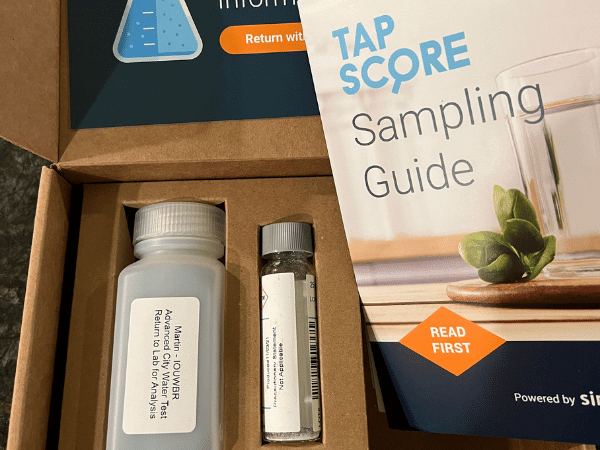
You might think you can spot hard water from a mile away, but sometimes, it’s the silent culprits doing the damage. Testing is the only real way to know. While a quick TDS meter test can give you a rough idea, a thorough water test will break down the who’s who of minerals in your well.
Do I Really Need A Softener?
Here’s the skinny: while minerals aren’t bad for you, they can be harsh on your appliances and pipes. If you’ve got more than 7 PPM of hardness, investing in a softener might just save you from bigger bills in the future.
How Do They Work?
There are three main players in the game:
- Salt-based – These guys literally swap out the minerals.
- Salt-free – They play it cool and just neutralize the minerals.
- Electronic descalers – A bit techy, they use magnetic waves to suspend minerals.
Each has its strengths and weaknesses, so consider what works best for your home!
Before You Buy

Hold your horses! Before you take the plunge, let’s ensure that you’ve ticked all the boxes. This section is your final checkpoint, ensuring you’ve considered every angle, every aspect, and every potential issue. Walk through this comprehensive checklist and enter the world of water softeners with utmost confidence and clarity.
- Flow Rate: Ensure the softener can handle the flow rate your household needs.
- Installation: While many offer DIY installation, you might want a professional touch for well water systems.
- Certifications: Just as in our example, seek NSF certified products.
- Branding: Opt for brands known for specializing in well water solutions.
- Support: Always a bonus if the company offers excellent post-purchase support.
Remember, well water has its quirks. But with the right water softener system, you can turn those challenges into liquid gold. Dive deep, research well, and may your water always be soft and pure! Cheers to making well-informed choices!
Remember, well water has its quirks. But with the right water softener system, you can turn those challenges into liquid gold. Dive deep, research well, and may your water always be soft and pure! Cheers to making well-informed choices!
FAQ’s

Salt-based can remove iron, but most remove 2 PPM or less — more can permanently damage the resin. Choose a system that is equipped with special media engineered for greater iron removal.
Resin is self-cleaning, but it degrades over time based on its initial quality and your water chemistry. If your system is adequately sized, it can last up to 25 years, but 10-15 is a good average.
Negatively charged resin attracts positively charged minerals, trapping them in a chemical bond. The salt or potassium in the brine solution breaks the bonds and sweeps minerals down the drain.
The national average is $800 – $1200, but it depends on the complexity of the installation.
Most don’t. However, systems that use air injection technology to remove iron can make a loud hissing noise during regeneration when the piston operates.
Water softeners are relatively easy to install, but it requires cutting pipe — something not all homeowners are comfortable with. If you have irregular plumbing, limited space, or don’t know a hammer from a screwdriver, consider hiring a plumber.
 148 people found this helpful. Was this guide helpful to you?
148 people found this helpful. Was this guide helpful to you? 
